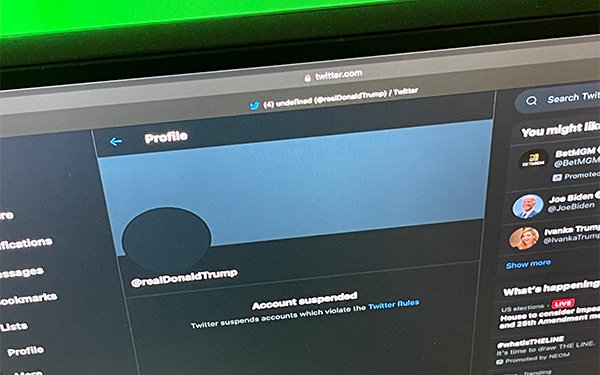Twitter Urges Judge To Nix Trump's 'Censorship' Lawsuit
- by Wendy Davis @wendyndavis, December 10, 2021

Twitter is asking a federal judge to throw out a a lawsuit by former president Donald Trump, who says the company violated his First Amendment rights by “censoring” him.
In papers filed Thursday with U.S. District Court Judge James Donato in San Francisco, the company says Trump's claims “ignore that the First Amendment protects Twitter’s decisions to exercise editorial control and judgment over what content is and is not published through its communications platform.”
Twitter adds, “The government (and courts) cannot force the private operator of an online platform, such as Twitter, to disseminate speech with which the operator disagrees.”
The papers come in response to a lawsuit dating to July, when Trump sued Twitter (along with Facebook and YouTube) for banning him.
The companies did so in early January, shortly after Trump's supporters stormed the Capitol in an effort to prevent the Senate from certifying President Joe Biden's victory in the last election.
Trump (along with several other people who were banned by social media platforms) claimed in the lawsuits filed in federal court in Florida that Twitter, Facebook and YouTube are “state actors” -- meaning equivalent to the government -- and that their editorial decisions about content amount to unconstitutional censorship.
In October, Trump sought an order requiring Twitter to immediately restore his account, arguing that his ongoing absence from Twitter could hurt the Republican Party's chances of winning future elections.
A federal judge in Florida transferred the lawsuit against Twitter to California, without ruling on Trump's request for immediate reinstatement.
Twitter argues in its new papers that numerous courts in California -- including the influential 9th Circuit Court of Appeals -- have ruled in other cases that social media platforms aren't “state actors,” and therefore can't be sued over their editorial decisions. The company specifically referenced the 9th Circuit's decision siding with Google in a lawsuit brought by Prager University.
Prager had alleged its First Amendment rights were violated when its clips were “censored” by Google's YouTube.
The appellate judges unanimously ruled that Google isn't bound by the First Amendment's prohibition on censorship, because the First Amendment only applies to government entities and not private companies like YouTube.
“Despite YouTube’s ubiquity and its role as a public-facing platform, it remains a private forum, not a public forum subject to judicial scrutiny under the First Amendment,” Circuit Judge Margaret McKeown wrote in that case.
Trump alleged in his lawsuit that the ban should be considered “state action” -- the same as if the government had banned him -- on the theory that government officials pressured Twitter into removing his account.
“Since 2019, Democrat [sic] members of the United States Congress, as well as now-President Joe Biden, have subjected social media companies and their CEOs, including Defendant, to increasing pressure to censor speech disfavored by them, and to promote their favored speech, or else face catastrophic legislative and/or regulatory consequences,” Trump argued earlier this year, apparently referring to the possibility that Congress could repeal or revise Section 230 of the Communications Decency Act. That law protects Twitter and other online publishers from liability over posts by users.
Twitter counters in its new papers that Trump failed to allege the kinds of facts that would prove lawmakers coerced the company.
“The complaint points to statements by a member of Congress that called for Twitter to suspend Mr. Trump’s Twitter account but did not threaten any sanctions against Twitter for failure to do so,” the company writes.
Twitter adds that an order requiring it to restore Trump's account would amount to “government-compelled speech,” which would violate the First Amendment.
“Such an extreme and overbroad infringement on Twitter’s rights would be patently unconstitutional,” the company says.


